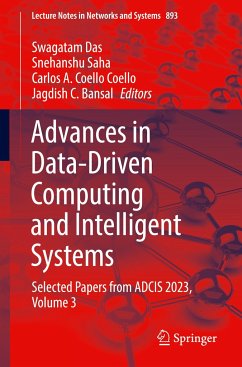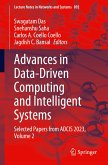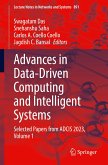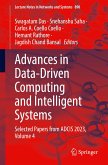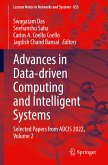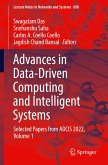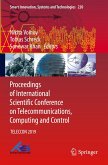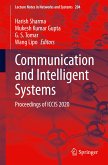Advances in Data-Driven Computing and Intelligent Systems
Selected Papers from ADCIS 2023, Volume 3
Herausgegeben:Das, Swagatam; Saha, Snehanshu; Coello Coello, Carlos A.; Bansal, Jagdish C.
Advances in Data-Driven Computing and Intelligent Systems
Selected Papers from ADCIS 2023, Volume 3
Herausgegeben:Das, Swagatam; Saha, Snehanshu; Coello Coello, Carlos A.; Bansal, Jagdish C.
- Broschiertes Buch
- Merkliste
- Auf die Merkliste
- Bewerten Bewerten
- Teilen
- Produkt teilen
- Produkterinnerung
- Produkterinnerung
This book is a collection of best-selected research papers presented at the International Conference on Advances in Data-driven Computing and Intelligent Systems (ADCIS 2023) held at BITS Pilani, K. K. Birla Goa Campus, Goa, India, during September 21-23, 2023. It includes state-of-the-art research work in the cutting-edge technologies in the field of data science and intelligent systems. The book presents data-driven computing; it is a new field of computational analysis which uses provided data to directly produce predictive outcomes. The book is useful for academicians, research scholars, and industry persons.…mehr
Andere Kunden interessierten sich auch für
![Advances in Data-Driven Computing and Intelligent Systems Advances in Data-Driven Computing and Intelligent Systems]() Advances in Data-Driven Computing and Intelligent Systems149,99 €
Advances in Data-Driven Computing and Intelligent Systems149,99 €![Advances in Data-Driven Computing and Intelligent Systems Advances in Data-Driven Computing and Intelligent Systems]() Advances in Data-Driven Computing and Intelligent Systems153,99 €
Advances in Data-Driven Computing and Intelligent Systems153,99 €![Advances in Data-Driven Computing and Intelligent Systems Advances in Data-Driven Computing and Intelligent Systems]() Advances in Data-Driven Computing and Intelligent Systems164,99 €
Advances in Data-Driven Computing and Intelligent Systems164,99 €![Advances in Data-driven Computing and Intelligent Systems Advances in Data-driven Computing and Intelligent Systems]() Advances in Data-driven Computing and Intelligent Systems208,99 €
Advances in Data-driven Computing and Intelligent Systems208,99 €![Advances in Data-Driven Computing and Intelligent Systems Advances in Data-Driven Computing and Intelligent Systems]() Advances in Data-Driven Computing and Intelligent Systems171,99 €
Advances in Data-Driven Computing and Intelligent Systems171,99 €![Proceedings of International Scientific Conference on Telecommunications, Computing and Control Proceedings of International Scientific Conference on Telecommunications, Computing and Control]() Proceedings of International Scientific Conference on Telecommunications, Computing and Control208,99 €
Proceedings of International Scientific Conference on Telecommunications, Computing and Control208,99 €![Communication and Intelligent Systems Communication and Intelligent Systems]() Communication and Intelligent Systems149,99 €
Communication and Intelligent Systems149,99 €-
-
-
This book is a collection of best-selected research papers presented at the International Conference on Advances in Data-driven Computing and Intelligent Systems (ADCIS 2023) held at BITS Pilani, K. K. Birla Goa Campus, Goa, India, during September 21-23, 2023. It includes state-of-the-art research work in the cutting-edge technologies in the field of data science and intelligent systems. The book presents data-driven computing; it is a new field of computational analysis which uses provided data to directly produce predictive outcomes. The book is useful for academicians, research scholars, and industry persons.
Produktdetails
- Produktdetails
- Lecture Notes in Networks and Systems 893
- Verlag: Springer / Springer Nature Singapore / Springer, Berlin
- Artikelnr. des Verlages: 978-981-99-9517-2
- 2024
- Seitenzahl: 588
- Erscheinungstermin: 20. März 2024
- Englisch
- Abmessung: 235mm x 155mm x 30mm
- Gewicht: 986g
- ISBN-13: 9789819995172
- ISBN-10: 9819995175
- Artikelnr.: 69514584
- Herstellerkennzeichnung
- Springer-Verlag GmbH
- Tiergartenstr. 17
- 69121 Heidelberg
- ProductSafety@springernature.com
- Lecture Notes in Networks and Systems 893
- Verlag: Springer / Springer Nature Singapore / Springer, Berlin
- Artikelnr. des Verlages: 978-981-99-9517-2
- 2024
- Seitenzahl: 588
- Erscheinungstermin: 20. März 2024
- Englisch
- Abmessung: 235mm x 155mm x 30mm
- Gewicht: 986g
- ISBN-13: 9789819995172
- ISBN-10: 9819995175
- Artikelnr.: 69514584
- Herstellerkennzeichnung
- Springer-Verlag GmbH
- Tiergartenstr. 17
- 69121 Heidelberg
- ProductSafety@springernature.com
Swagatam Das received the B. E. Tel. E., M. E. Tel. E (Control Engineering specialization), and Ph. D. degrees, all from Jadavpur University, India, in 2003, 2005, and 2009, respectively. Swagatam Das is currently serving as an associate professor and the head of the Electronics and Communication Sciences Unit of the Indian Statistical Institute, Kolkata, India. His research interests include evolutionary computing and machine learning. Dr. Das has published more than 300 research articles in peer-reviewed journals and international conferences. He is the founding co-editor-in-chief of swarm and evolutionary computation, an international journal from Elsevier. He has also served as or is serving as the associate editor of the IEEE Transactions on Cybernetics, Pattern Recognition (Elsevier), Neurocomputing (Elsevier), Information Sciences (Elsevier), IEEE Trans. on Systems, Man, and Cybernetics: Systems, and so on. Snehanshu Saha holds Master's Degree in Mathematical and Computational Sciences at Clemson University, USA, and Ph.D. from the Department of Applied Mathematics at the University of Texas at Arlington in 2008. He was the recipient of the prestigious Dean's Fellowship during Ph.D. and Summa Cum Laude for being in the top of the class. After working briefly at his Alma matter, Snehanshu moved to the University of Texas El Paso as a regular full-time faculty in the Department of Mathematical Sciences, University of Texas El Paso. Currently, he is a professor of Computer Science and Engineering at PES University since 2011 and heads the Center for AstroInformatis, Modeling, and Simulation. He is also a visiting professor at the Department of Statistics, University of Georgia, USA, and BTS Pilani, India. Carlos A. Coello Coello (Fellow, IEEE) received the Ph.D. degree in computer science from Tulane University, New Orleans, LA, USA, in 1996. He is currently a professor with Distinction (CINVESTAV-3F Researcher), Computer Science Department, CINVESTAV-IPN, Mexico City, Mexico. He has authored and co-authored over 500 technical papers and book chapters. He has also co-authored the book Evolutionary Algorithms for Solving Multiobjective Problems (2nd ed., Springer, 2007) and has edited three more books with publishers such as World Scientific and Springer. His publications currently report over 60000 citations in Google Scholar (his H-index is 96). His major research interests are evolutionary multi-objective optimization and constraint-handling techniques for evolutionary algorithms. He has received several awards, including the National Research Award (in 2007) from the Mexican Academy of Science (in the area of exact sciences), the 2009 Medal to the Scientific Merit from Mexico City's congress, the Ciudad Capital: Heberto Castillo 2011 Award for scientists under the age of 45, in Basic Science, the 2012 Scopus Award (Mexico's edition) for being the most highlycited scientist in engineering in the five years previous to the award and the 2012 National Medal of Science in Physics, Mathematics, and Natural Sciences from Mexico's presidency (this is the most important award that a scientist can receive in Mexico). He also received the Luis Elizondo Award from the Tecnológico de Monterrey in 2019. Dr. Jagdish Chand Bansal is an Associate Professor (Senior Grade) at South Asian University New Delhi and Visiting Faculty at Maths and Computer Science, Liverpool Hope University UK. He also holds visiting professorship at NIT Goa, India. Dr. Bansal obtained his Ph.D. in Mathematics from IIT Roorkee. Before joining SAU New Delhi, he worked as an Assistant Professor at ABV- Indian Institute of Information Technology and Management Gwalior and BITS Pilani. His Primary area of interest is Swarm Intelligence and Nature Inspired Optimization Techniques. Recently, he proposed a fission-fusion social structure based optimization algorithm, Spider Monkey Optimization (SMO), which is being applied to various problems in the engineering domain. He has published over 70 research papers in various international journals/conferences. He is the Section Editor (editor-in-chief) of the journal MethodsX published by Elsevier. He is the series editor of the book series Algorithms for Intelligent Systems (AIS), Studies in Autonomic, Data-driven and Industrial Computing (SADIC), and Innovations in Sustainable Technologies and Computing (ISTC) published by Springer. He is also the Associate Editor of Engineering Applications of Artificial Intelligence (EAAI) and ARRAY published by Elsevier. He is the general secretary of the Soft Computing Research Society (SCRS). He has also received Gold Medal at UG and PG levels.
A comprehensive review: Sentiment Analysis for Indian local Languages.- Face Recognition-Based Surveillance System.- Comparative Analysis of Malware Classification using Supervised Machine Learning Algorithms.- Noise filtering algorithm based on Machine learning for identification of ground hitting photons in Jaipur city.- Data-driven interior plan generation for residential buildings in Vietnam.- A weekly scheduling of operating theaters using Multi Agent Planner.- Using website content for detecting phishing URLs: A Novel approach.- Attention and Residual-Atrous Convolutional Learning-Based CNN Architecture for Lung Nodule Segmentation and Classification.- Adaptive Segmentation on Extracting Textural and Fractal Patterns for Assessing Mangrove Dynamics using Multi-spectral Data.- Exploring Multivariate Chemometric Tool for Simultaneous Determination of Erectile Dysfunction Drugs in Pharmaceutical Formulation.- Mass transport of combined oscillating electroosmotic and pressure drivenflow through cylindrical nanopore considering ion partitioning effects.- Audio Signal Analysis and Classification of Bluetooth Vulnerabilities using Machine Learning Techniques.- Performance Evaluation of Thresholding-based Segmentation Algorithms for Aerial Imagery.- Estimation of particle Froude Number in Deposited Bed Condition using Hybrid Machine Learning Models.- An Image based Automated Potato Leaf Disease Detection Model.- Unsupervised Synthetic Code-Mixed Data Generation.- Automated Building Segmentation in Areal images using Boundary Edge Detection.
A comprehensive review: Sentiment Analysis for Indian local Languages.- Face Recognition-Based Surveillance System.- Comparative Analysis of Malware Classification using Supervised Machine Learning Algorithms.- Noise filtering algorithm based on Machine learning for identification of ground hitting photons in Jaipur city.- Data-driven interior plan generation for residential buildings in Vietnam.- A weekly scheduling of operating theaters using Multi Agent Planner.- Using website content for detecting phishing URLs: A Novel approach.- Attention and Residual-Atrous Convolutional Learning-Based CNN Architecture for Lung Nodule Segmentation and Classification.- Adaptive Segmentation on Extracting Textural and Fractal Patterns for Assessing Mangrove Dynamics using Multi-spectral Data.- Exploring Multivariate Chemometric Tool for Simultaneous Determination of Erectile Dysfunction Drugs in Pharmaceutical Formulation.- Mass transport of combined oscillating electroosmotic and pressure drivenflow through cylindrical nanopore considering ion partitioning effects.- Audio Signal Analysis and Classification of Bluetooth Vulnerabilities using Machine Learning Techniques.- Performance Evaluation of Thresholding-based Segmentation Algorithms for Aerial Imagery.- Estimation of particle Froude Number in Deposited Bed Condition using Hybrid Machine Learning Models.- An Image based Automated Potato Leaf Disease Detection Model.- Unsupervised Synthetic Code-Mixed Data Generation.- Automated Building Segmentation in Areal images using Boundary Edge Detection.

